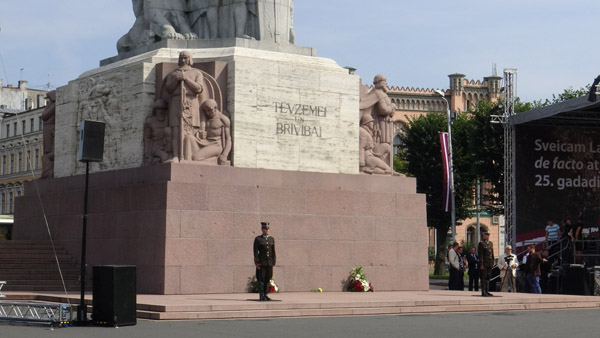As a nation with unfortunate history of numerous invasions and occupations, Latvia has a fair share of patriotic holidays that celebrate its liberations and cessations of persecutions (often temporary, as later history would show).
Most patriotic holidays have their key celebrations at or near the Freedom statue in Riga, a monumental symbol of the nation.
Two main independence days (both public holidays) are:
*Proclamation Day of the Republic of Latvia (November 18th), commemorating the declaration of the Republic in 1918.
*Resoration of Independence day (May 5th), commemorating the redeclaration of Latvian independence from the Soviet occupation in 1991.
Other days commemorate less important events.
*Lāčplēsis Day (November 11th) commemorates soldiers who fell for independence of Latvia (1918-1920). The date coincides with the Latvian victory over Bermontians in battle over Riga (1919). Latvians celebrate the festival lighting candles and marching with torches in evening parades.
*Day of de facto independence of Latvia (August 25th) commemorates the final collapse of Soviet Union in 1991 when the Latvian independence seemingly became irreversible. The commemoration is mostly official.

Latvian patriotic holidays tend to divide Latvia somewhat. They are eagerly celebrated by ethnic Latvians, however they are often ignored by ethnic Russians. That’s because it was the Russians who the ones who oppressed Latvians necessitating the liberations and victories that the independence days commemorate.
No Latvian patriotic holiday is however as despised by Russians as the Latvian Legion day (March 15th). It commemorates the World War 2 Latvian Legion and falls on the date when this legion fought the only Latvian-led battle of World War 2 (against the Russian Red Army which sought to occupy Latvia).
Latvian Legion supported by Nazi Germany which sought to repulse Soviets just as much as Latvians did. To ethnic Russians the fact that Latvians eagerly fought against Red Army lengthening the Nazi German occupation instead of restarting Soviet one destroys their national myth that “Soviet Union had liberated Latvia”. Therefore Russian media (sometimes repeated by Western media) to this day regularly portrays the event as a pro-Nazi one.
To Latvians however, Latvian Legion was their own army and not pro-Nazi: it did not participate in any Nazi war crimes and it was projected by Latvian elite to succeed as the army of independent Latvia should both Germany and Russia be defeated (as happened after World War 1). Moreover, Soviet occupation was much more deadly to Latvians than was the Nazi occupation.
Nevertheless, the Latvian Legion day was stripped of its official status in order not to annoy Russians, but it is still celebrated every year by patriotic Latvians who march to the Freedom statue in Riga and the Latvian legion cemetery, carrying flags. As the years pass by and Legionnaires die out, they are replaced by young patriots in these parades.
